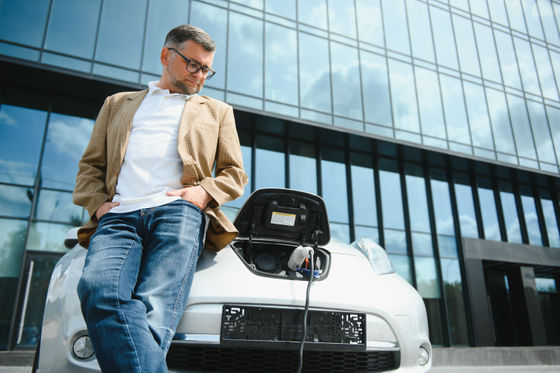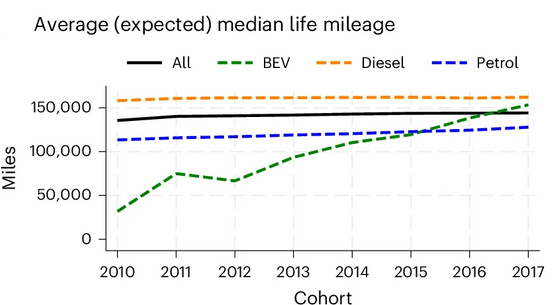Researchers prove that EVs now have the same reliability and lifespan as traditional internal combustion engine vehicles

Many people are hesitant to buy an electric vehicle (EV) because they are worried about breakdowns or short driving ranges due to battery wear. Unlike early EVs, which had problems with durability and service life, research has shown that modern EVs have reliability and lifespans that are comparable to traditional cars such as gasoline-powered vehicles.
The closing longevity gap between battery electric vehicles and internal combustion vehicles in Great Britain | Nature Energy
Battery-powered electric vehicles now match petrol and diesel ties for longevity
https://www.lse.ac.uk/News/Latest-news-from-LSE/2025/a-January-25/battery-powered-electric-vehicles-bevs-match-petrol-diesel-for-longevity
Electric Vehicles Now Rival Traditional Cars in Reliability and Lifespan, Study Finds
https://scitechdaily.com/electric-vehicles-now-rival-traditional-cars-in-reliability-and-lifespan-study-finds/
According to Viet Nguyen Tien, a researcher at the London School of Economics and Political Science (LSE), the production of a typical EV requires six times as many key resources as a conventional car, and its environmental impact is 50% higher than that of an internal combustion engine vehicle (ICEV).
This means that before EVs can claim to be greener than ICEVs, they need to be in use for a sufficient period of time to offset any initial environmental impact.

In their study, published in the peer-reviewed scientific journal Nature Energy on January 24, 2025, Nguyen Tien et al. analyzed approximately 300 million vehicle inspection (MOT) data collected by the UK Department of Transport from 2005 to 2022.
As a result, while early battery electric vehicles (BEVs) did indeed have a shorter lifespan than ICEVs, technological advances have resulted in the average lifespan of BEVs in recent years being 18.4 years, roughly the same as that of a typical gasoline vehicle, and the maximum driving range has reached up to 124,000 miles (about 200,000 km), which is longer than that of a gasoline vehicle.
The graph below shows the trend in lifetime mileage, which is the estimated distance a vehicle will travel before being scrapped. BEVs (green dashed line) had a very short lifespan in the early 2010s, but caught up with gasoline-powered vehicles (blue dashed line) by the mid-2010s.

The specific average lifespan and lifetime mileage for each vehicle type are as follows:
| Vehicle Type | Average Life Span (years) | Median lifetime mileage |
|---|---|---|
| Electric Vehicles (EV) | 18.4 | 124,207.8 miles/approximately 200,000 km |
| Diesel vehicles | 16.8 | 159,775.1 miles/approximately 250,000 km |
| Gasoline vehicles | 18.7 | 116,050.7 miles/approximately 180,000 km |
The top five EV manufacturers were as follows:
| Manufacturer | Average Life Span (years) | Median lifetime mileage |
|---|---|---|
| Tesla | 20.3 | 204,197.9 miles/approximately 320,000 km |
| Hyun-dae | 15.6 | 138,463.5 miles/approximately 220,000 km |
| Nissan | 18.8 | 121,771.1 miles/approximately 190,000 km |
| Kia | 18.5 | 116,654.4 miles/approximately 180,000 km |
| Mercedes | 16.1 | 90,926.3 miles/approximately 140,000 km |
'Our findings provide important insights into the lifespan and environmental impact of electric vehicles,' said Nguyen Tien. 'BEVs are no longer a niche option but a viable, sustainable alternative to traditional cars, marking a major step towards realizing a net-zero carbon future.'
Co-author Robert Elliott, Professor of Economics at the University of Birmingham, said: 'BEVs offer significant environmental benefits, particularly as Europe moves towards renewable energy. Although they have higher initial emissions during production, their long lifespan means that EVs can quickly offset their carbon emissions, making them a more sustainable long-term option that helps fight climate change.'
Related Posts:







